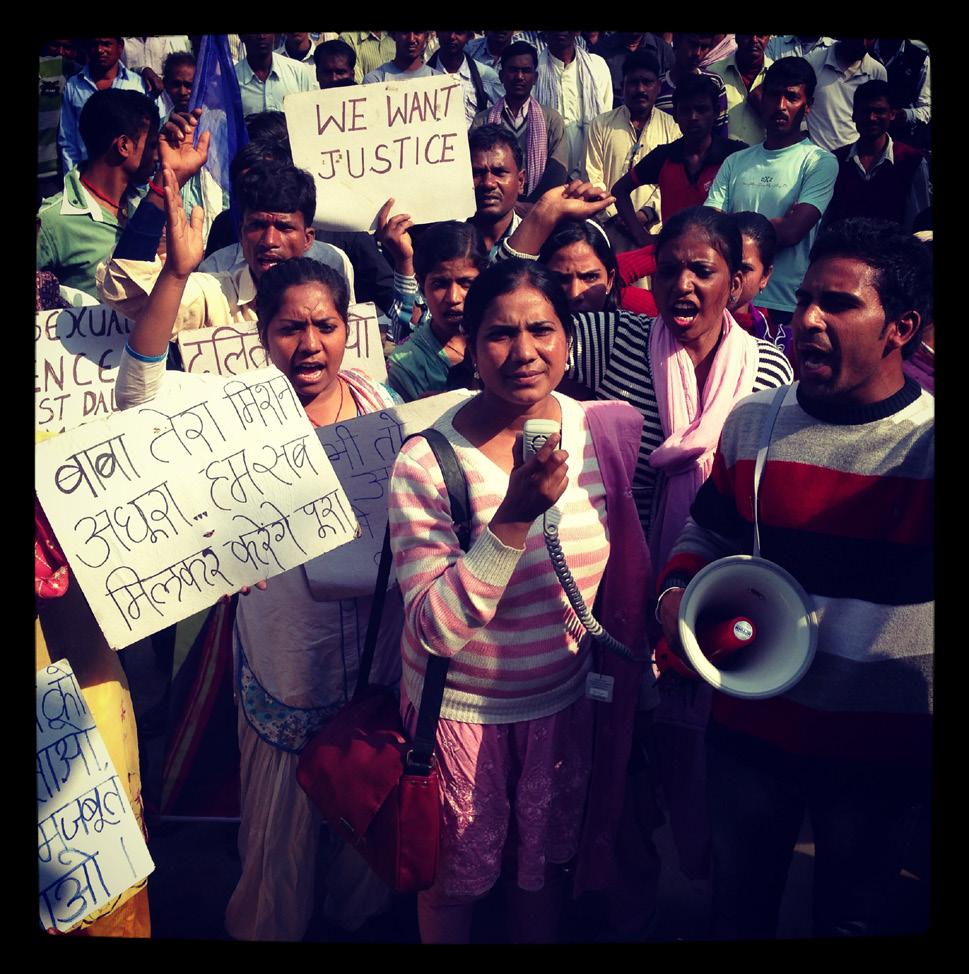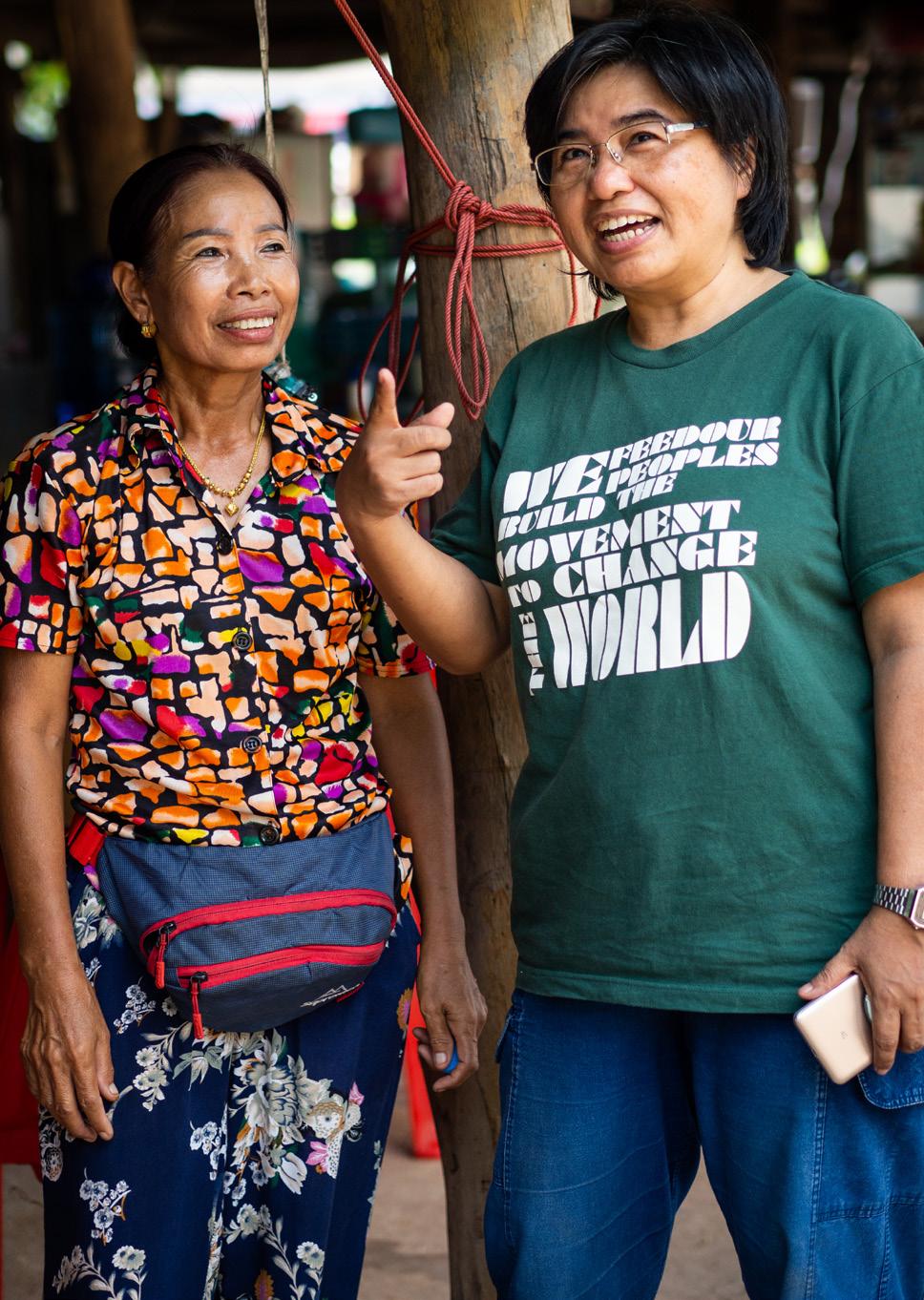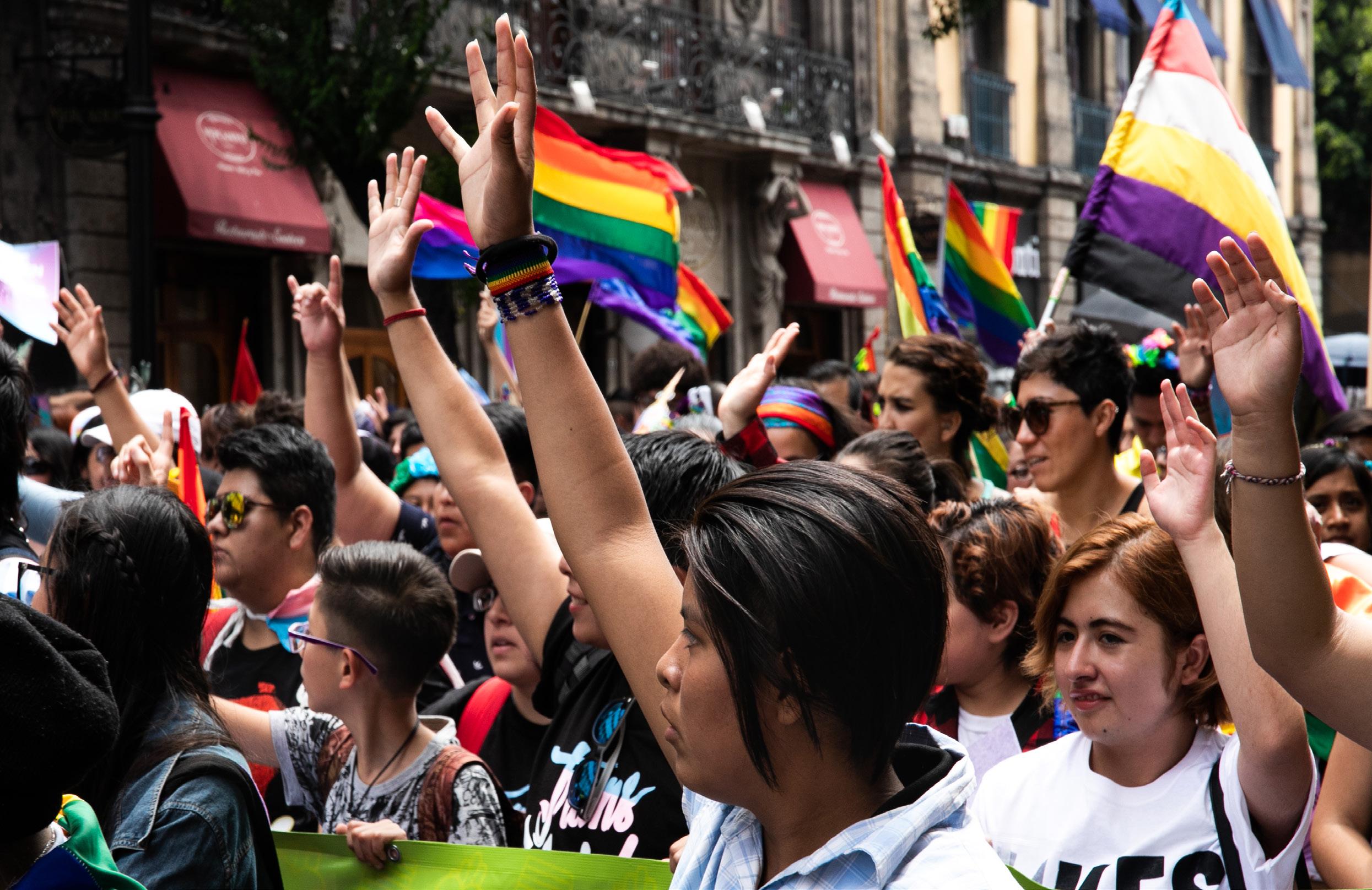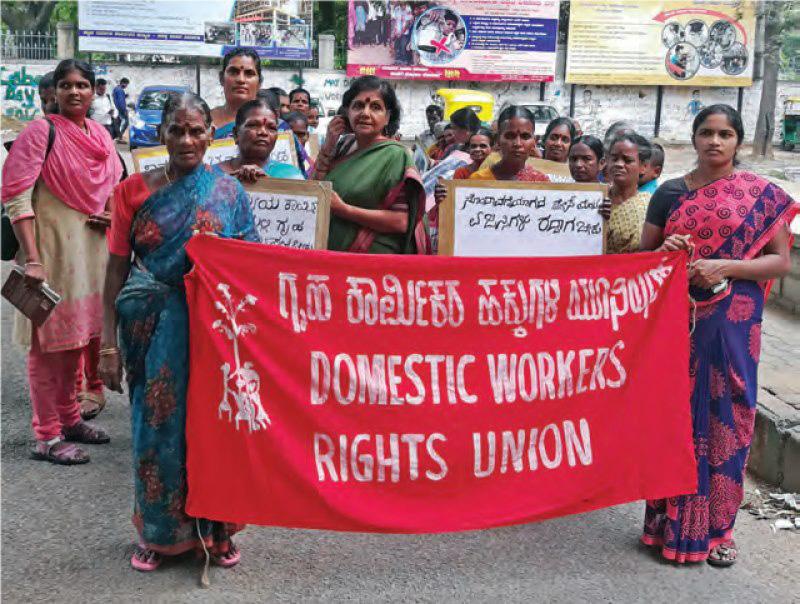
7 minute read
Who is a human rights defender?
Non-violent methods of expression and demanding equal rights, such as protests, are central to human rights defense. Here, women human rights defenders from India are demanding justice. Photo credit: Thenmozhi Soundararajan.

Advertisement
Anne Lapapan Supamanta from NHRF grantee partner, Assembly of the Poor, is a human rights defender from Thailand supporting rights to land and natural resources for local communities There is no universal definition of a human rights defender, but the term is used to describe people who, individually or with others, act to promote or protect human rights. Human rights defenders can address any human rights concerns - ranging from issues of arbitrary arrest and detention, to issues of employment, land and access to health care. Human rights defenders are active in every part of the world. The NHRF refers to all our grantees as human rights defenders due to the nature of your human rights work and the means you use in your struggle for justice while also recognizing the specific and unique risks taken by those who assume a public role as a human rights defender.
The normative framework that we base our work on protection for and support to you as human rights defenders is the Declaration on the Rights and Responsibility of Individuals, Groups and Organs of Society to Promote and protect Universally Recognised Human Rights and Fundamental Freedoms (1998) - often referred to as the United Nations (UN) Declaration on Human Rights Defenders https://bit.ly/2Qu73C0. It is the first UN instrument that affirms that everyone has the right to defend human rights and recognizes the importance and legitimacy of the work of human rights defenders, as well as their need for better protection. Although the Declaration is not legally binding, it draws together provisions from those legally binding instruments that are most relevant to human rights defenders, including the International Covenant on Civil and Political Rights (ICCPR) and the International Covenant on Economic, Social and Cultural Rights (ICESR). Moreover, the Declaration was adopted by consensus by the UN General Assembly and thereby constitutes a clear commitment made by all UN member states to respect the rights of human rights defenders at the national and international levels.
The Declaration does not create new rights. However, it articulates existing rights in a way that makes it easier to apply them to the practical role and situation of human rights defenders. The Declaration provides for specific protections to human rights defenders. Examples include the right to seek the protection and realisation of human rights at the national and international levels; to conduct human rights work individually and in association with others; to form associations and nongovernmental organisations; and to solicit, receive and utilise resources for the purpose of protecting human rights, including the receipt of funds from abroad.
UN Declaration on Human Rights Defenders
Follow this link for more information about the Declaration and to access the full text in different languages:
UN Declaration on Human Rights Defenders https://bit.ly/2Qu73C0

The Declaration states that everyone has duties towards and within the community and encourages us all to be human rights defenders. Pictured here are families and community members coming together for a signature campaign. (Photo credit: NHRF grantee partner, Human Rights Office – Kandy, Sri Lanka)
Furthermore, the Declaration outlines specific duties of States with regard to defending human rights. It states that the State has the prime responsibility to take all necessary steps to ensure the protection of those who defend human rights. Examples of the State’s duties include the protection, promotion and implementation of all human rights; the adoption of such legislative, administrative and other steps as may be necessary to ensure effective implementation of rights and freedoms; conducting prompt and impartial investigations of alleged violations of human rights; and providing an effective remedy for persons who claim to have been victims of a human rights violation. The Declaration also emphasises that everyone has duties towards and within the community and encourages us all to be human rights defenders. Finally, it explains its relationship with national and international law with the aim of assuring the application of the highest possible legal standards of human rights.
According to the Declaration, human rights defenders’ work must be conducted through peaceful activities. The Declaration clearly states that the act of defending human rights is a right and that everybody has the right to promote, develop and protect human rights by lawful and peaceful means. These rights are linked to the right to freedom of expression, association and movement, and the right to take part in the conduct of public affairs found in the ICCPRhttps://bit.ly/2J6VrRj. 3 Freedom of expression and association in particular are important rights in order to be able to conduct meaningful human rights work.
In 2000, the then UN Commission on Human Rights (the predecessor of the UN Human Rights Council) established a mandate on the situation of human rights defenders (as a Special Procedure) to support the implementation of the Declaration on Human Rights Defenders. Over the years a range of resolutions have been adopted on the subject of human rights defenders, including the crucial Resolution 25/18 https://bit. ly/2wbV9WN that was adopted on 28 March 2014 by the UN Human Rights Council4. In this resolution, the Council expresses its concerns over the risks human rights defenders face due to threats, attacks and reprisals and calls on States to ensure that national laws and policies support and enable their work and are consistent with international human rights law. With this resolution the Human Rights Council also decided to renew the mandate of the Special Rapporteur on the situation for human rights defenders for a period of three consecutive years (For more information see the section on Relevant UN mechanisms for human rights defenders on page 35).
Freedom of expression and association, in particular, are important rights in order to be able to conduct meaningful human rights work. Photo: Demonstration in Mexico.
3 International Covenant on Civil and Political Rights https://bit.ly/2J6VrRj 4 A/HRC/RES/25/18 https://bit.ly/2wbV9WN


The Declaration clearly states that the act of defending human rights is a right and that everybody has the right to promote and protect human rights by lawful and peaceful means. Photo: Human rights defender from NHRF grantee partner in Thailand.

Human rights defenders are an integral part of civil society and States have an obligation to provide safe and enabling spaces and protection for all actors within this group to exercise their rights. Photo: Demonstration by domestic workers in India. – K.G.F. – W.A.
5 GA Resolution 68/181 https://bit.ly/2xLOF11 6 HRC Resolution 31/32 https://bit.ly/2U24k58 7 Twentieth anniversary and promotion of the Declaration on the Right and Responsibility of Individuals, Groups and Organs of Society to Promote and Protect Universally Recognized Human Rights and Fundamental Freedoms https://bit.ly/2UqgIel 8 A/HRC/RES/38/12 https://bit.ly/2Qx2G9l 9 A/HRC/32/20 https://bit.ly/2xLOW43 Other important resolutions include the UN General Assembly’s landmark Resolution 68/181 https://bit.ly/2xLOF11 in December 2013 on the protection of women human rights defenders and Resolution 31/32 https://bit.ly/2U24k58 adopted by the Human Rights Council in April 2016 calling on States to fulfill their obligations to protect defenders addressing economic, social and cultural rights and to create a safe and enabling environment for them.5 6 Another important source is the 2017 resolution https://bit.ly/2UqgIel adopted by the UN General Assembly to mark the 20th anniversary of the Declaration on Human Rights Defenders in 2018 and to outline a series of activities to encourage its promotion and implementation.7
Recognizing human rights defenders as part of civil society and the need for designated and enabling spaces and protection for all actors within this group to exercise their rights, recent UN resolutions and reports have addressed this nexus by acknowledging the “fundamental contribution that civil society and human rights defenders make to the promotion of human rights, the creation of peaceful dialogue and the building of pluralistic democracies” and by calling on States to “fulfil their obligation to respect and fully protect the civil, political, economic, social and cultural rights of all individuals, online and offline as applicable, inter alia, the right to freedom of expression and opinion, including artistic expression and creativity, and the right to assemble peacefully and associate freely;”8 9 Such local and international advocacy have brought an irrefutable awareness to States that they have legal obligations under international and, for many, domestic law to not only protect civil society actors and human rights defenders but also to promote their active participation by creating a safe environment for them.






